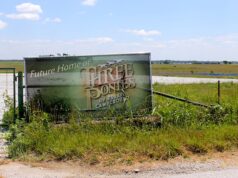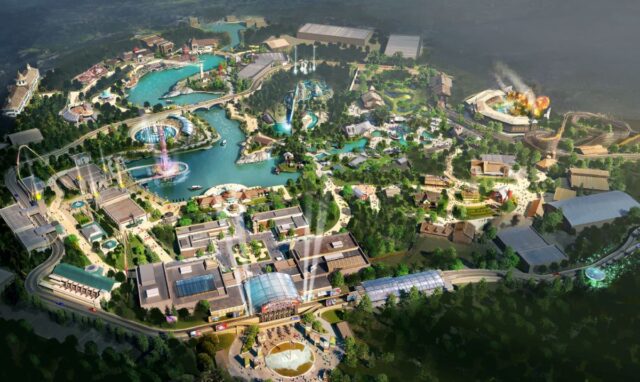
(Update: In the afternoon of Tuesday, Sept. 26, the Vinita City Council voted 7-1 during a special public hearing to approve the proposal to annex several square miles for the planned American Heartland Theme Park and Resort. Council members also voted to direct the city attorney to draft an ordinance on the annexation, which they will consider and vote on at a later meeting. The following article remains in its original form.)
Local leaders from northeast Oklahoma are planning to ask the Legislature for at least $36 million of infrastructure improvements to support a massive $2 billion theme park and resort announced in July by a Branson-based entertainment company. The request for state funding, however, could be much larger, and at least one prominent lawmaker has expressed a desire for more details.
Beyond their initial press release, executives with the proposed American Heartland Theme Park and Resort are not speaking publicly about their business venture, the financial model for which has already received industry scrutiny. American Heartland’s parent company, Mansion Entertainment, also faces questions about a pair of previously proposed theme park projects that fell apart and resulted in one investment broker being imprisoned for fraud.
Although the man behind the failed Texas and Alabama theme park ventures now works with American Heartland executives, the company’s spokeswoman says he is uninvolved with the Oklahoma theme park project, which would be developed on what is mostly farm land east of Vinita and west of Grand Lake.
American Heartland is an affiliate of Mansion Entertainment Group, which bills itself as the leading performing arts, animation and studio brand in Branson, a popular destination for vacationers from Missouri and across the country known for its collection of entertainment theaters.
“They’re not doing interviews currently,” said Kristin Goodale of the Gooden Group, an OKC public relations firm handling media requests for American Heartland Theme Park LLC, which formally incorporated Sept. 1.
Goodale did provide a statement from Kristy Adams, the senior executive vice president of marketing and sales for American Heartland and Mansion Entertainment Group.
“One of the many reasons we chose Oklahoma as the home for American Heartland is because the state has demonstrated a business-friendly approach to economic development,” Adams said in the statement. “The American Heartland team and Oklahoma Department of Commerce are working to explore economic development opportunities that would be mutually beneficial for the project and the state.”
Planned as a 1,000-acre development with a 125-acre theme park, American Heartland Theme would be comparable in size to Magic Kingdom Theme Park and Disneyland Park. The proposal features an Americana environment with a variety of rides, live shows, family attractions, waterways and restaurants. The development is also slated to include a 300-room hotel and indoor water park.
The adjacent 320-acre Three Ponies RV Park and Campground, designed by Oklahoma architects ADG Blatt and announced as the development’s first phase of the project, is being billed as the largest campground in the central U.S., with 750 RV spaces and 300 cabins plus amenities.
American Heartland officials bring up astronomical figures when describing the potential of their project, which they say will create more than 4,000 jobs and attract more than 4.9 million visitors from all over the world each year. In an effort to support and guide the area’s development, the Vinita City Council is considering whether to annex several square miles east of town, a controversial proposal slated for public discussion at 3 p.m. today.
“We’re pretty excited about the potential for growth for all of this area, even over to Grove,” said Josh Lee, the mayor of Vinita. “I really fully believe it will happen.”
Legislative leaders await details on funding ask
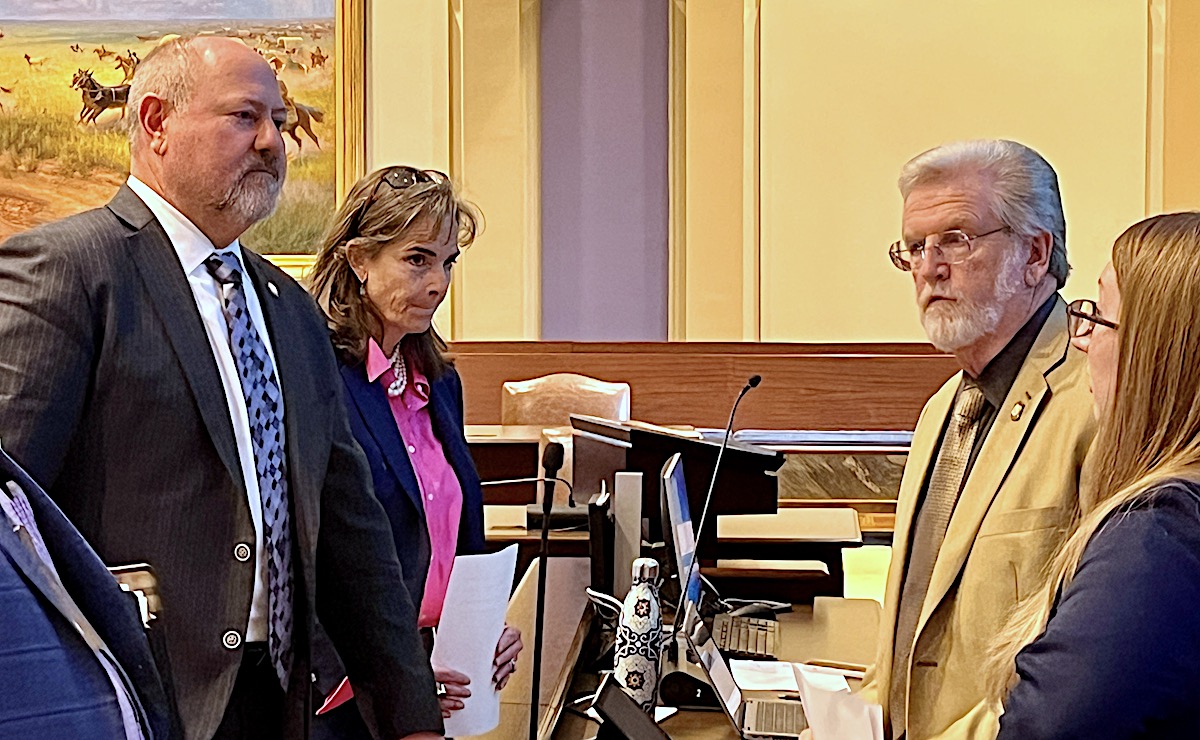
Lee is far from the only Oklahoma elected official working to make the American Heartland proposal leap off the drawing board and into reality.
Lt. Gov. Matt Pinnell said Aug. 25 that he was approached by American Heartland investors months ago and that he is now working with the local community and developers “to see if we can make that project viable in the state.”
“To that point, there’s not a lot I can say about that project specifically other than we are working with the company on a weekly basis,” said Pinnell, who serves on Gov. Kevin Stitt’s Cabinet as secretary of tourism, wildlife and heritage.
Pinnell, who was recently named secretary of workforce development as well, said he is talking regularly with legislators in the Vinita area.
“A lot of what’s going on right now is just locally because we’re not in a legislative session,” Pinnell said, acknowledging that significant public funding will be sought next session. “I’m not ready to say what that number is, but I do anticipate an ask from them to the state.”
Hopper Smith, interim executive director of the Oklahoma Department of Commerce, has several existing economic development projects on the agency’s plate. He said July 26 that he has been impressed with the American Heartland leadership team.
“They’re pretty well committed,” Smith said. “Now it’s just a question of getting the infrastructure built up to support all the expansion and all the plans that they have. (…) It’s of the magnitude that it will require some legislative action, in all probability.”
Two weeks after the proposed park was announced, Senate Appropriations and Budget Chairman Roger Thompson (R-Okemah) said July 31 that he was surprised project backers had not met comprehensively with legislative leaders before issuing their press release.
“For you to come to the state and say, ‘I’m going to spend $2 billion and then you’re going to be my partner,’ when I don’t know what that partnership looks like? I’m starting at a disadvantage,” he said. “I like to be a good partner, but I don’t like to be boxed in.”
Thompson said he has signed a nondisclosure agreement that prevents him from discussing some of what he has been told about the theme park venture.
“My understanding is the city of Vinita is going to be coming and asking for infrastructure and water infrastructure to facilitate it,” Thompson said. “They need about $36 million for water and sewer infrastructure. (…) That’s the only ask that I have been approached with at this particular time.”
Thompson said further discussions are needed to see if the city of Vinita plans to provide any funding for the improvements.
“I just need to see more of the plan,” Thompson said. “There’s going to be a lot of infrastructure that’s going to be done. You’re going to have highways, you’re going to have services (…) you’re going to have more law enforcement in the area.”
If the project succeeds as a large tourist attraction, motels, restaurants and other businesses are expected to be developed as well, which Thompson said will strain the local water and sewer treatment plants.
“I think we’re at the beginning of that discussion,” he said. “We’re looking forward to it. It’s nothing at this time that this office is seriously considering, because I have nothing to consider. My personal opinion is I shall believe it when I see it. I think it makes excellent conversation.”
Thompson’s counterpart, House Appropriations and Budget Chairman Kevin Wallace, said the secrecy surrounding the project is not surprising. He said people had to sign nondisclosure agreements before learning much about it.
“I’m optimistic,” Wallace said July 31. “I don’t have all the parts and pieces — all the information.”
Beyond upgrades in the city of Vinita to provide water and other services, Interstate 44 turnpike improvements and county road upgrades will be needed for the theme park and resort to become a reality, he said.
“The infrastructure won’t be built ahead of time without proving that they’re going to build the facility there,” said Wallace (R-Wellston). “The state won’t go out and put in all the infrastructure for something that’s just not going to come in. Just like the utility companies, they won’t put in the service that’s projected. It’s whatever business is going in that day, that’s what they’re going to provide service for.”
The governor’s office also has not been presented with any financial requests from American Heartland or from the area, a spokeswoman said Sept. 18.
“Different funds exist to help attract businesses to our state, though none have been set aside for this endeavor at this time,” said Abegail Cave, Stitt’s communications director. “The project is in its early planning stages, so while our office is aware of the potential ask, no such request has been made yet. The governor and the Department of Commerce will continue discussions with the city of Vinita and Heartland Entertainment.”
‘This isn’t a Vinita project (…) this is an Oklahoma project’
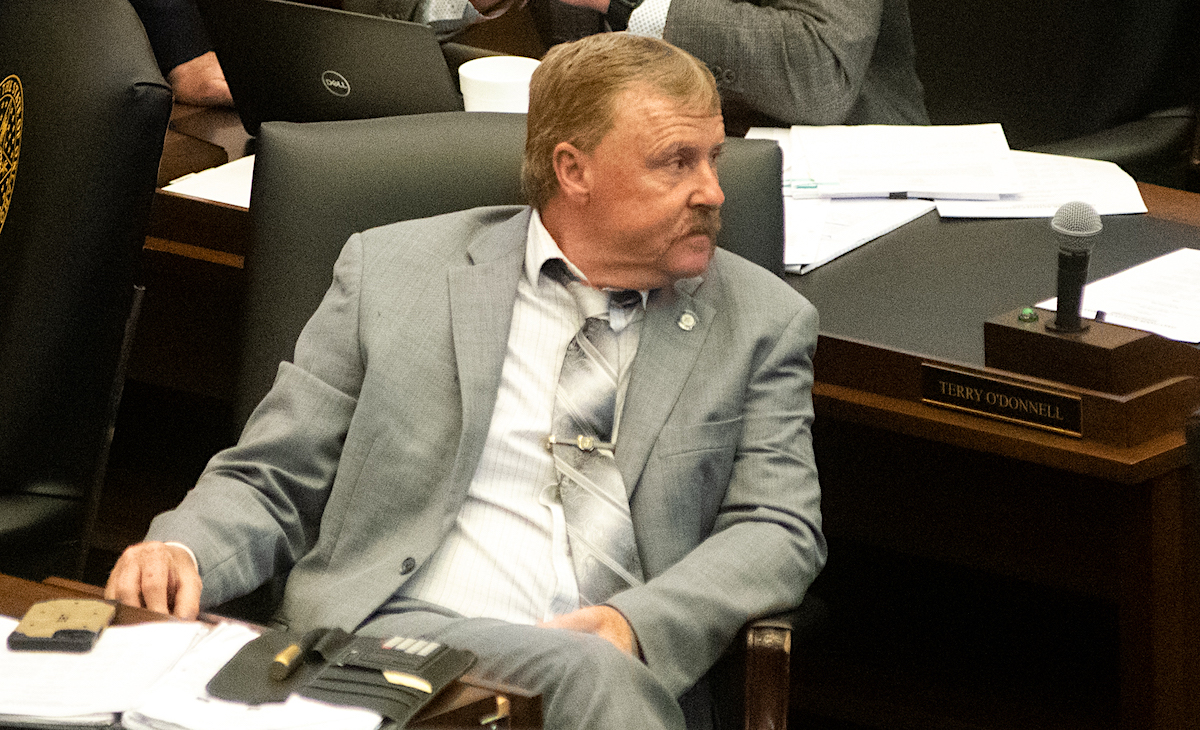
Vinita Mayor Josh Lee said Sept. 8 that the city is still tallying what kind of financial assistance it will seek from the state.
“I think $30 million, $35 million is probably the bottom number on that,” he said. “It could be north of that. It could be closer to $60 million if you start talking wastewater facilities, water storage and those kinds of things. It’s a big project, and it comes with big numbers. But it comes with a huge, huge, huge potential upside for us.”
Lee said it is logical for the Vinita community to reach out to the state for financial help.
“This isn’t a Vinita project (…) this is an Oklahoma project,” he said.
Sen. Micheal Bergstrom (R-Adair) said Sept. 6 that local and area officials are compiling a list of necessary investments that can be presented to legislators for the 2024 regular session, which starts in February.
“We will probably have some requests of the state to help with some infrastructure, possibly water and sewer and of course the highways,” Bergstrom said. “Beyond that we’ll just have to see what it looks like as we get into next session and how things are progressing with the company.”
Improvements to the State Highway 82 and U.S. 60 intersection near the proposed amusement park are already part of the Oklahoma Department of Transportation’s eight-year plan, but the work may have to be expedited and expanded, Bergstrom said. To accommodate the large volume of expected traffic, he said the new intersection’s design may have to be upgraded from a super two-lane highway to perhaps a five-lane highway.
“I would imagine we will see other businesses coming in as well, so we want to make sure we have what’s needed for that,” Bergstrom said.
Rep. Rusty Cornwell (R-Vinita) said Sept. 12 that he hopes to present information to the House Appropriations and Budget Committee and make a funding request.
“We’ll go to them with the asks, and we’ll give them the projections of what this could mean for the state of Oklahoma and the region,” he said. “And they’ll do their homework and help us any way they can. I don’t anticipate anything other than that, honestly.”
The American Heartland Theme Park and Resort would be a big economic boom for the area, he said.
“I’m excited about the project,” Cornwell said. “I think it’s going to bring a lot of business not just to this region but the four-state area and all of Oklahoma.”
He said he understands some residents’ concerns about the proposal, but he said the city is working to alleviate their fears.
“I believe that the people that bought the property to put in the park (…) have the right to do so,” Cornwell said. “But I’m also a property rights guy for those people that are around the park and (we should) try to make sure that the negative impact on them would be as minimal as possible.”
Cornwell said people who are investing in the theme park have also bought several thousand acres of land east of the proposed amusement park heading to Grand Lake.
“They’re anticipating the growth to go towards the lake,” he said.
Cornwell concedes that Mansion Entertainment’s goal to have the theme park open by 2026 is ambitious, but backers want to time its opening with the 2026 centennial of Route 66, which runs along what would be the proposed park’s entrance.
“If they could possibly get this project done to where they could benefit from that centennial of Route 66, they could have it up and running, then that’s what they would like to do,” Cornwell said. “And whether they can get that done, I’m not sure. But that’s what they’ve announced, and hopefully they can get it done.”
Work on RV park could start before end of 2023
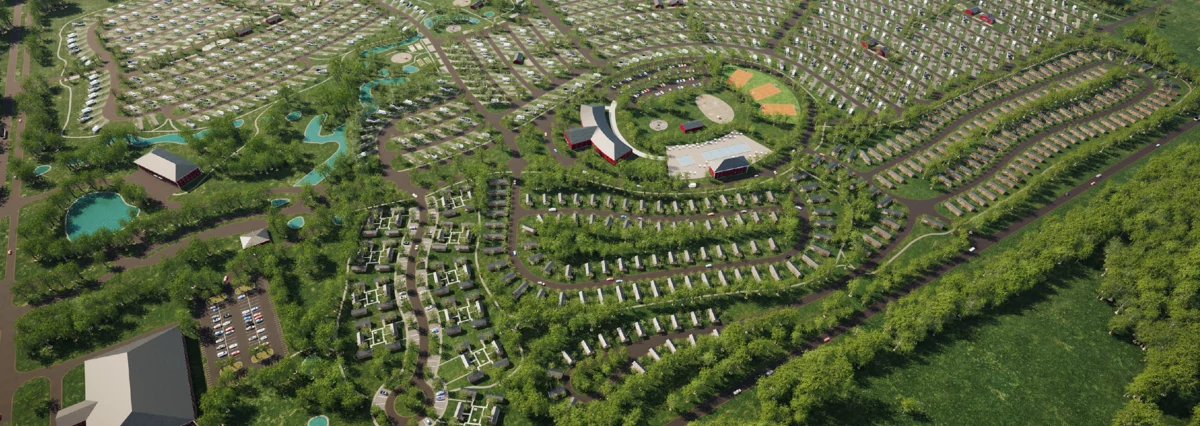
Although American Heartland officials declined NonDoc’s request to discuss their plans, Lee said he is confident company leaders are serious with their proposal.
“I’m very optimistic,” he said. “Just listening to all the different engineers, architects, designers, and seeing the money that they’re spending. They’re spending millions and millions and millions of dollars.”
The mayor said he expects to see ground broken on the Three Ponies RV Park and Campground before Thanksgiving, or perhaps as soon as Halloween. Groundbreaking for the theme park is scheduled to occur next year, with completion eyed for 2026.
The announcement of the proposed American Heartland project made national news, and its media release featured comments from local officials and Smith, the interim Department of Commerce director.
Government officials with the Cherokee Nation, one of the region’s largest employers and biggest tourism draws, were not at the announcement event. According to The Oklahoman, tribal officials said they were not invited until the day before the event, despite the park being planned within the Cherokee Reservation. A company spokeswoman said meetings have occurred with Cherokee leaders and other tribes.
Smith said the company behind the project, Mansion Entertainment, handled the announcement and media releases.
“We had been aware of it, but for reasons of (…) disclosure agreements and agreements of confidentiality, and we were in competition with other states, we had to keep a low profile on that,” Smith said.
Smith said he is optimistic that the American Heartland Theme Park and Resort will materialize.
“They’ve done a lot of engineering studies,” he said. “I think that’s an indication of how serious they are. (…) If it goes forward, and we’re very hopeful that it will, it will change that whole neighborhood up in northeastern Oklahoma, up around Vinita.”
Industry expert skeptical of American Heartland project
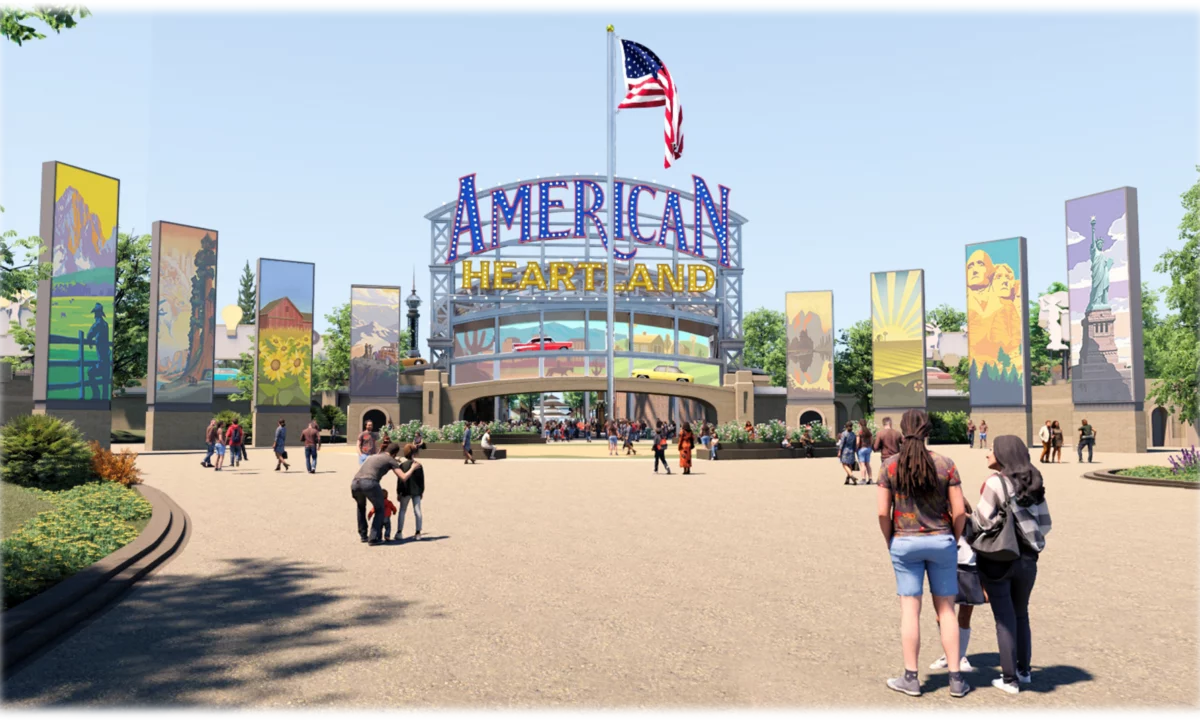
Despite those plans, industry expert Robert Niles, who runs Theme Park Insider, has noted that critical questions remain for the American Heartland proposal.
As reported in The Hustle daily newsletter, those questions include how the project is being financed. The $2 billion price tag for the theme park and resort is roughly the same as the current market cap of the entire Six Flags theme park chain.
“Even a $100 million park would struggle to make back investment,” Niles wrote of the proposal.
He also questions how people will get to a theme park in rural northeast Oklahoma.
Although backers say it will attract 2 million out-of-state visitors a year, the proposed American Heartland location is “miles away from any major city or airport,” Niles noted.
It will be especially difficult for a theme park to attract that many visitors without a popular tie-in, he said. Disney World attendance is slumping despite the draw of the characters from Mickey Mouse, Marvel, Star Wars and more, Niles said.
At present, American Heartland’s most prominent figure is its founder and chief creative officer, Gene Bicknell. Now 91 years old, Bicknell was born just south of the Kansas border in Picher, a lead and zinc mining town disincorporated and evacuated in 2009 as part of the Tar Creek Superfund Site response. Now defined by chainlink fence, heaping chat piles and a gorilla statue honoring the former high school, Picher sits abandoned about 35 minutes northeast of Vinita.
After earning a business degree from Pittsburg State University in southeast Kansas, Bicknell joined the Pizza Hut franchise network in 1962, four years after the first location opened in Wichita. After PepsiCo bought Pizza Hut, he took his company public under the name National Pizza Co., later known as NPC International Inc. With Bicknell in charge, the company operated more than 800 Pizza Hut locations worldwide. He sold the company for $615 million in 2006, and the state of Kansas attempted to collect $42.5 million in taxes related to the sale. Bicknell argued that he resided in Florida and filed his Kansas tax returns only as a nonresident, ultimately winning a Kansas Supreme Court case and recovering $63 million.
Bicknell’s primary partner in the Vinita theme park endeavor is American Heartland CEO Larry Wilhite, who is also the CEO of Manson Entertainment Group, a company most known for its recently rebranded Mansion Theatre for Performing Arts in Branson. The company produced a TV special this year, and it is delving into video, audio and animation production in the Missouri area. Regarding one of the company’s recent offshoots, Wilhite said his studios and soundstages possess “new state-of-the-art custom-made equipment exclusive to Mansion Sound,” which “is currently not available anywhere else in the world.”
A tale of two theme parks that never got built
Listed as executive producer of the Mansion Theatre is Rick Silanskas, a composer and film producer who was a guiding force behind two failed proposals for large theme parks in Texas and Alabama. Silanskas did not return phone messages left at the theater.
Adams, the senior executive vice president of marketing and sales for American Heartland, told NonDoc that “Silanskas is not part of any American Heartland or Three Ponies entities, nor is he involved in the development of these projects.”
But Silanskas, Bicknell and Wilhite have worked together recently. Each is credited as either a writer or producer of an animated short film from 2022 titled Gene’s 6th Symphony. Mansion Animation is listed as the production company on the film’s poster. Bicknell, Wilhite and Silanskas have also collaborated as lyricists, composers and publishers of songs released this year under The Gene Bicknell Project umbrella.
While Pinnell, Bergstrom and Lee each said they have met with top leaders of American Heartland, such as Bicknell and Wilhite, none recalled meeting Rick Silanskas during their conversations.
In 2014, Silansakas was chief executive officer of a proposed Texas theme park called DreamVision, which released a slick video featuring artists’ renderings of the rides and attractions guests would enjoy once the park opened its gates to the public sometime in 2019.
According to a 2016 article in the Dallas Observer, the video said visitors to the park — planned near Fort Worth, Texas — would walk down “the magical Pathway of Hope” and encounter a series of themed lands, a layout similar to the American Heartland plan.
For the DreamVision park, the proposed areas included a winter landscape capped with a plastic mountain and a faux-New York City skyline with yellow cab bumper cars and a stock market-themed roller coaster. Plans included the DreamScape resort, with components to be engineered by some of the biggest names in the theme park business, according to promotional materials.
The DreamVision idea seemed lofty, but there were some small assurances, such as the company’s claim that they had former Walt Disney Co. executive Ron Logan as their chief creative officer and that they had financial backing from an investment company called Provident Global Capital.
About the same time Silanskas was promoting the Texas theme park, he became involved with developing a similar type of entertainment venue in Alabama. In early 2015, DreamVision announced plans for a $3.5 billion music-inspired theme park and resort destination, DreamVision Soundscape, pitched for completion in 2019 in Muscle Shoals.
Proponents said they park would feature musically themed “neighborhoods” showcasing country, pop, gospel and jazz music, with all-age rides and golf courses, hotels and retail, according to an article in Attractions Magazine.
Despite the big plans and flashy promotional videos, no actual construction occurred at either proposed theme park.
Problems developed with Provident Global Capital’s financing. In 2016, the Alabama Securities Commission posted a cease-and-desist order against Bryan Robinson, the company’s chief executive officer. It was alleged Robinson took at least $600,000 from investors to purchase and remodel 85 foreclosed homes but never purchased the homes, according to the Birmingham Business Journal.
That same year, Robinson pleaded guilty to one count of securities fraud and received a 10-year sentence in Lauderdale County, Alabama, for operating a business that perpetrated “fraud or deceit on more than 40 Alabama investors.” He was ordered to repay more than $7 million to those he duped over the massive park plan proposed for Muscle Shoals.
Logan, who had a 23-year career with Disney, spoke to Attractions Magazine in 2018 about the DreamVision theme parks’ implosion.
“The whole thing came crashing down, in Texas and Muscle Shoals. It was instant. We were just told, there is no more cash. That’s it,” Logan said. “And then all the lawsuits start, which really destroys everything. I’m not used to that kind of stuff, because I am very careful about what I do, and I don’t get anyone involved with anything that isn’t good for them. And our reaction to the whole situation was like, ‘What?’ It was just a terrible, terrible time.”
Logan died in August 2022 at the age of 84.
As proposed, the American Heartland Theme Park and Resort contains similar elements to the fizzled Texas and Alabama concepts. According to the American Heartland press release, the park proposed for northeast Oklahoma also will a slate of themes and is said to have several accomplished theme park designers involved, including more than 20 former Disney Parks builders and Walt Disney “imagineers.”
Theme park themes
The American Heartland Theme Park and Resort is proposed to feature six distinctly American lands “to welcome guests on a journey through the best of the American story.” The themes include Great Plains, Bayou Bay, Big Timber Falls, Stony Point Harbor, Liberty Village and Electropolis.
The design team is led by Steve Hedrick, who worked from 1982 to 2002 as an executive producer at Disney. For another 19 years, he served as as chief creative officer at DHP Creative before joining Mansion Entertainment Group in March 2022.
According to the release, American Heartland’s design firms include THG, FORREC and Cuningham, whose portfolios feature theme park brands like Six Flags, Disney Parks and Universal Studios.
“American Heartland will be a place families can come together to create lasting memories, experience joy, laughter, imagination and wonder,” Bicknell said in the press release. “There is so much to celebrate about our country: its landscapes, its cultures and most importantly, its people. No matter where you’re from, you’ll feel right at home at American Heartland.”
Emotions run high in Vinita about property annexation
In Vinita, some residents are concerned about the city’s plan to annex land east of the city in an effort to maintain influence over area development. A proposal for Vinita’s city limits to be extended about eight square miles drew about 350 people to an Aug. 22 meeting that lasted more than four hours.
Council members let everyone talk, Lee said. The original plan was shelved, and city council members are now looking at annexing about six square miles from east of Vinita to Ten Mile Corner and State Highway 82. A public hearing on the proposal is scheduled for 3 p.m. today.
“The full area wasn’t needed at this time,” Lee said of the original annexation plan.
The vast majority of the proposed annexation is farm and ranch land with several scattered businesses, the mayor said. Most of the land will keep that classification, with some new businesses expected to move in after the theme park is established.
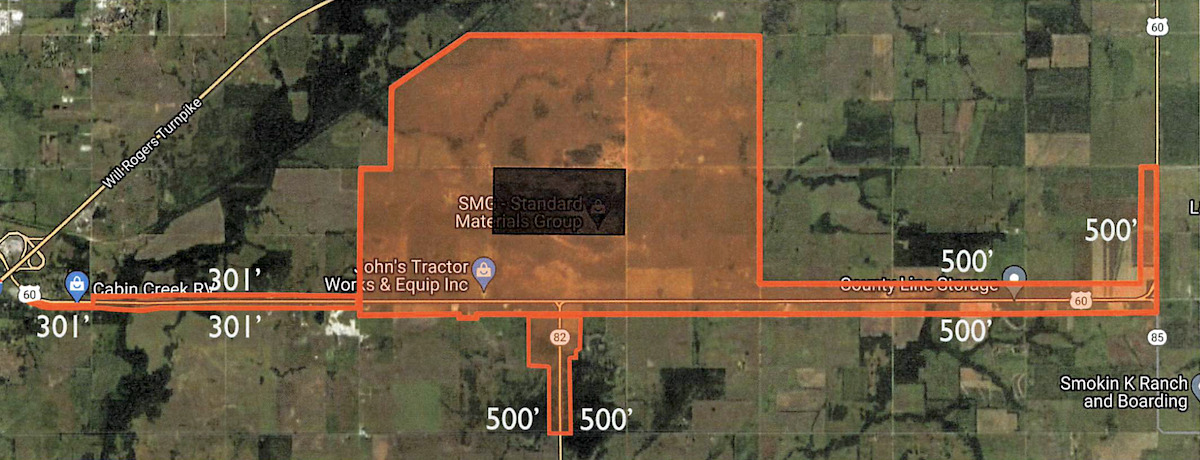
The purpose of the annexation is to provide city services and public safety to the area, he said.
“If you’re going to experience what we expect to be a pretty large growth and a kind of a boom, we want to be able to control how that looks if that happens,” Lee said. “Instead of having a big mess out there, we would like to be able to kind of control some of the types of businesses that come in.”
Lee said there would be anticipated land-use restrictions in the area, which is now being called the Palace District, a code name for the theme park used by the Department of Commerce.
“The park is obviously a family friendly and faith-based group, and it’s a faith-based and family friendly venture that they’re going to do,” he said. “The last thing we want is to have certain establishments directly across the street from the entry to a family park.”
Dillon Johnson, a 29-year-old farmer and rancher who lives about five miles northeast of the proposed theme park, attended the Aug. 22 public hearing. The original annexation proposal by Vinita covered land that bordered his family’s property. The new annexation proposal would put that boundary about a mile away.
Johnson grew up in the area, left to work in Washington, D.C., and then moved back to the Afton area in 2020. He said he is skeptical about the project.
“It just seems a little far-fetched to me that you can drop this supposedly $2 billion project right in the middle of Craig County,” he said. “Obviously, people are excited about it for the jobs and everything.”
Johnson said he is not going to fight the American Heartland project.
“This company, if they have the money and they have the will to do it and they bought the land, I’m not really one to tell anybody what to do,” he said. “I don’t want somebody to come in and tell me what I can do with my land that I bought. Is a theme park what we necessarily need for economic development? I don’t know, but it’s the only option anyone is talking about right now.”
The issue has become very emotional for people on both sides, he said.
“People that don’t want it think it’s the worst thing in the world,” Johnson said. “The people that want it think everybody that is against the park — but also even against annexation — is just selfish and anti-progress and doesn’t care about the area.”
Follow @NonDocMedia on:
‘Is this a trick, or are we going to be left behind?’
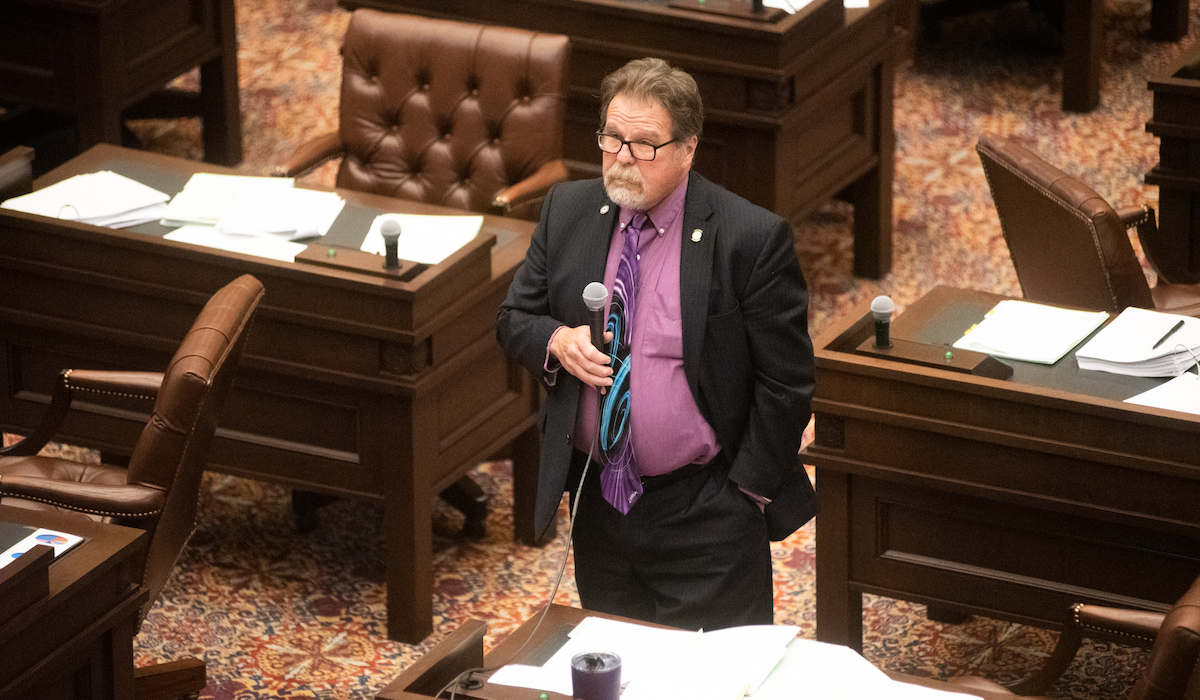
Bergstrom, a former educator who is the area’s state senator, said opposition was expected from the outset.
“There always are going to be some people who are not going to be thrilled about change, which is understandable,” Bergstrom said. “The majority of the folks that I’ve heard from are very much in favor of this project and are looking forward to it coming in.”
He said local families are excited about the potential for nearby recreation.
“I’ve also had a number of folks that have told me that they’re looking forward to the fact that — if all of this comes to fruition — they will be able to take their family to this park and not have to travel to Branson or Disney World,” Bergstrom said.
Cornwell, the state representative, said opportunities don’t come along too often for Vinita, which lost the Grand River Dam Authority’s headquarters in 2019. Some Vinita residents are saying they don’t want change, but change is already occurring, he said.
“The problem is you can look at the census, and there’s change happening,” Cornwell said. “It’s just the other direction. It’s a decline. We can sit here and continue to say we don’t want change until there’s no one left to listen to us.”
Lee said residents in his city have a healthy dose of skepticism, but most are hoping to see American Heartland’s proposal become reality.
“There is an overwhelming majority of the population that supports it and is excited about it,” he said. “Do a lot of those people still have some reservations like, ‘Is this a trick, or are we going to get left behind?’ Sure, I think a lot of people have that concern, and understandably so. It’s hard to wrap your brain around something this large.”













